Static Dress on recording one of the most intriguing UK rock debuts in years
As Static Dress release their debut album Rouge Carpet Disaster, frontman Olli Appleyard discusses the delicate balance between ambition and creative insanity
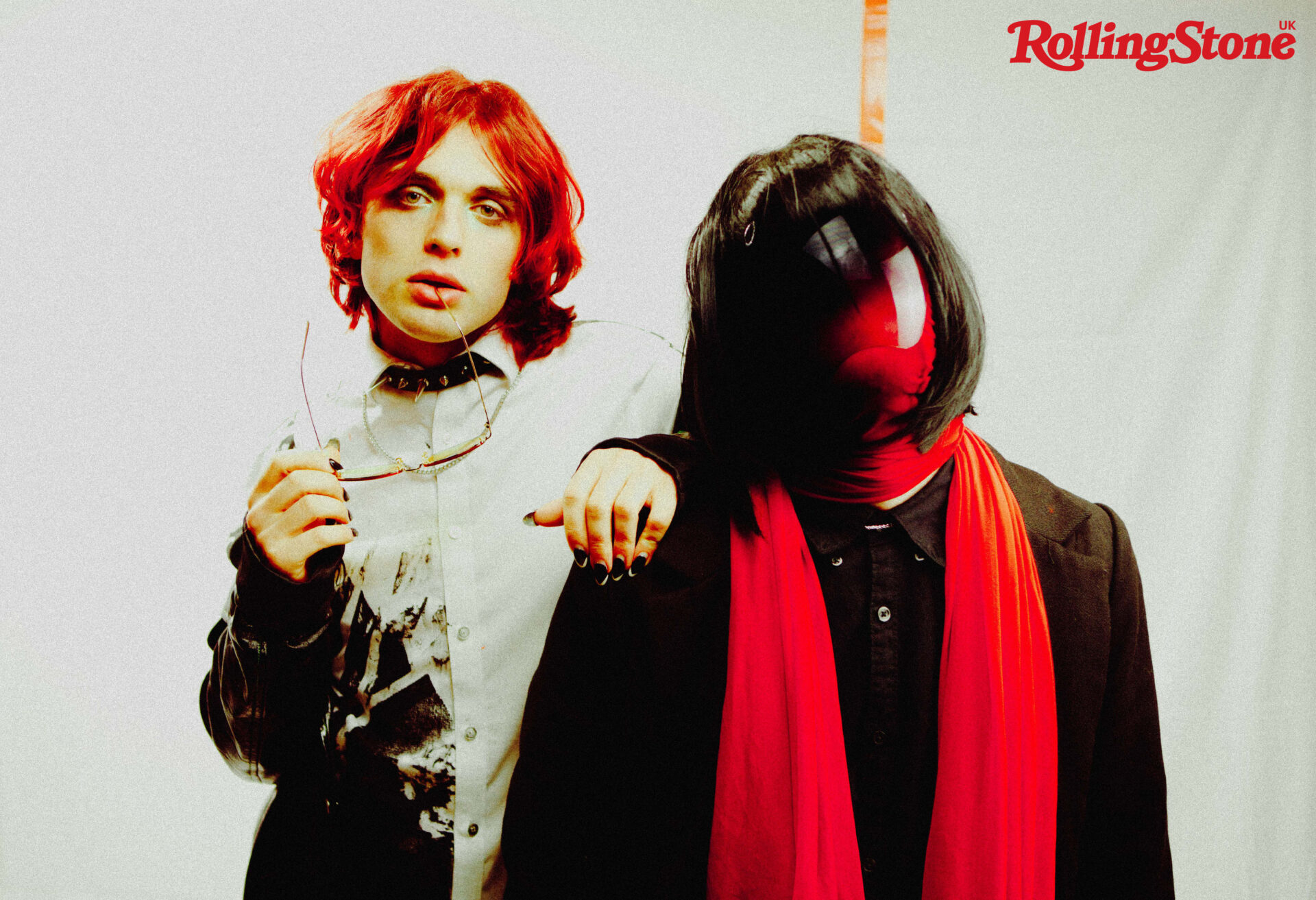
“Is it just me, or is this room sick?” Standing next to art and sculpture, Olli Appleyard is taken by his first visit to The Hepworth Wakefield, revelling in the brutalist architecture. He chats quickly as we wander around an exhibition on surrealism, musing about pieces that inspire — an emo-tastic display of surgical instruments and pieces that look uncannily like the ones Kim Kardashian shared of her daughter North West’s pandemic art.
He gravitates to ‘Parasol’, a giant painting by Berlin artist Stefanie Heinze, fixating on a section in the right-hand corner where cobalt blue meets garish orange. “I’m sorry if I go quiet,” he apologises. “It’s just that I’ll literally look at something like this and I’m… gone”.

Having just returned from a three-week stint supporting Funeral for a Friend, he’s openly exhausted, having stayed up until 5am this morning editing tour photos. But here he is, cracked iPhone in hand, taking photos that will inevitably inspire a creative idea. It might be a merch drop, a soundscape, a tiny clue to be written into something in four albums’ time. He’s not sure what yet, but these colours speak to him, and so they must be noted down.
It’s this relentless mentality that makes Static Dress one of the most promising new acts in the country, and Appleyard a serious frontperson to watch. Committed to the kind of concept and ambition that most wouldn’t consider tackling until they’re several records deep, the four-piece have been a band since 2018. In that short time they have strived to create a form of emo-hardcore that transcends categorisation. It’s a plan that appears to be working. With a steady stream of singles (plus soundtrack and Prologue comic book), they have racked up support slots with alt-rock contemporaries Holding Absence, Wargasm and Creeper, and gained a legion of their own devotees, who are drawn to their dexterity and intrigue. Now, there’s a debut album on the way, nailing feverish screamo and sensitive ballads with equal panache. Take these plaudits to their leader, and he’ll say that it’s all a matter of defiant perseverance.
“Everyone who shouldn’t be there, the fucking racists and homophobes, will get uncomfortable, and they’ll either fuck off or learn to acclimatise”
— Olli Appleyard, Static Dress
“The main thing for me is that I’ve never pushed this,” he explains. “I never wanted to be this band that was across all social media, begging you to listen. And I feel like, honestly, it’s nearly mission complete at this point. Every single music video, every single press thing or shoot… it might take time, but in my head I want everything to be the best it could possibly be. If you’re not winning, you’re losing. And who wants to lose?”
The Static Dress sound amalgamates a lot of modern rock’s best bits: The Used doing The 1975’s disembodied vocals, Taking Back Sunday choruses with brutal Underoath breakdowns, hints of Bring Me the Horizon’s sticky cybergoth via the enigmatic androgyny of Brian Molko or Gerard Way (and Appleyard somehow looks similar to both of those rock icons). By curating all these elements and restitching them into something sleeker, Static Dress have forged a sound and image that feels much more singular, futuristic even.
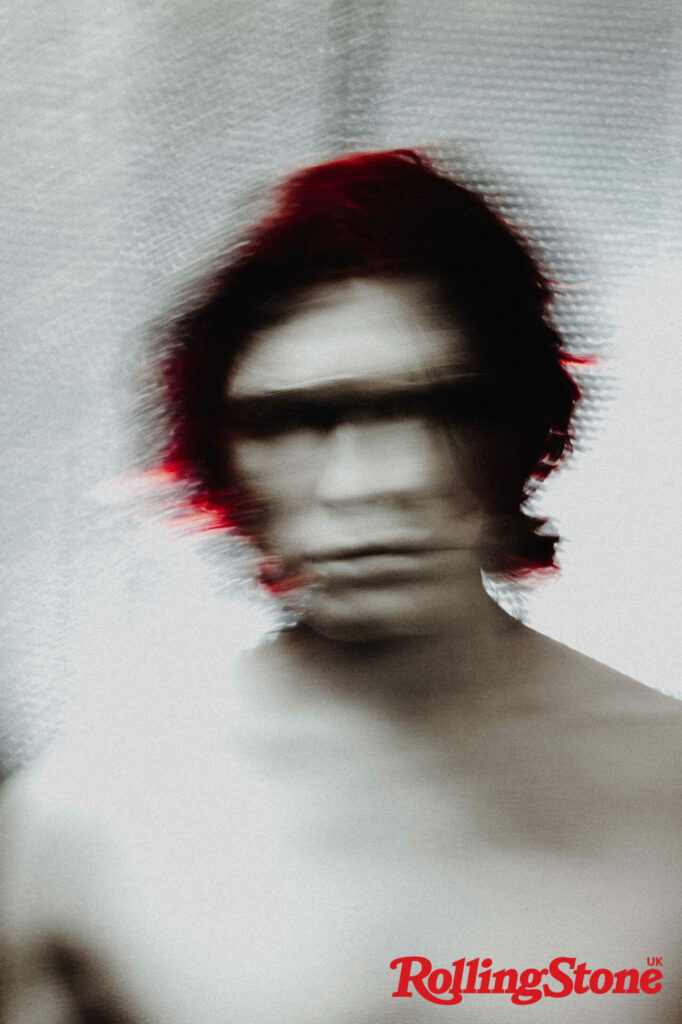
Although their polish has invoked whispers of the industry plant, the truth is as far from that as it is possible to be. Their rise is one of serious graft.
A keen drummer, skater — and upon injury, a skate photographer — Appleyard was a multi-hyphenate right out of the gates, putting on shows in Leeds and networking with the endearing naiveté of someone who just really wanted to be around music. Having taught himself composition with the family’s old VHS recorder, he made a name for himself as a gig photographer, becoming coveted by local venues for his unique visual perspective.
“I didn’t have anything like [Leeds rock venue] Key Club in my life, and I loved it. I’d drive there, work till 2am, then drive home and go to college the next day. When they needed photographers for Slam Dunk festival, I shot all of it, met all my favourite bands, and was genuinely like a kid in a candy shop,” he remembers. Soon, he was shooting full visual campaigns for international bands, helping them to craft their own narratives.

Around this time, Appleyard’s family moved from Bradford to Bingley, a small town that he describes as painfully narrow-minded. He has never publicly disclosed his sexuality, but his chosen mode of dress was enough to invoke casual homophobia, highlighting the judgemental nature of a scene that he is keen to leave behind.
“My DMs are always full of people giving me shit,” he reveals. “There are pages set up to be anti-me, like “Keep F-bombs out of hardcore.” He mentions the We Wear Black podcast, helmed by three rock journalists of colour who speak up about gender and racial issues within alternative rock. “They’re all fucking smashing it, and I’m so glad. The scene really needs that presence. I feel like everyone who shouldn’t be there, the fucking racists and homophobes, will get uncomfortable, and they’ll either fuck off or learn to acclimatise.”
“For me, I don’t want fans that don’t want to scratch beneath the surface of things. If you’re just gonna be like, swipe, swipe, swipe, I don’t want you listening to my music”
— Olli Appleyard, Static Dress
Like many great bands, there is a lot about Static Dress that feels designed to disturb the status quo. Ever since they began, they have distanced themselves from labels, or even full personal identification; Appleyard refuses to confirm his age, while guitarist Contrast performs behind a mask, a decision chosen for both personal comfort and “why the hell not” theatrics.
Deeply invested in folklore, they tease every announcement with a complex map of clues and riddles, fuelling a sizeable Reddit community who pore over their imagery to try and decipher the codes. Every element of the band’s messaging is planned out meticulously in advance; at one point in our conversation, Appleyard pulls out a “shortlist” of potential band names from 2019, taking at least five full scrolls to get down to Static Dress. Video treatments require similar imaginative storyboarding: “The one thing I never want to do is shoot a video where someone can go ‘Oh yeah, that’s Bingley’ — you can’t just go and be on set of The Matrix, you know?”
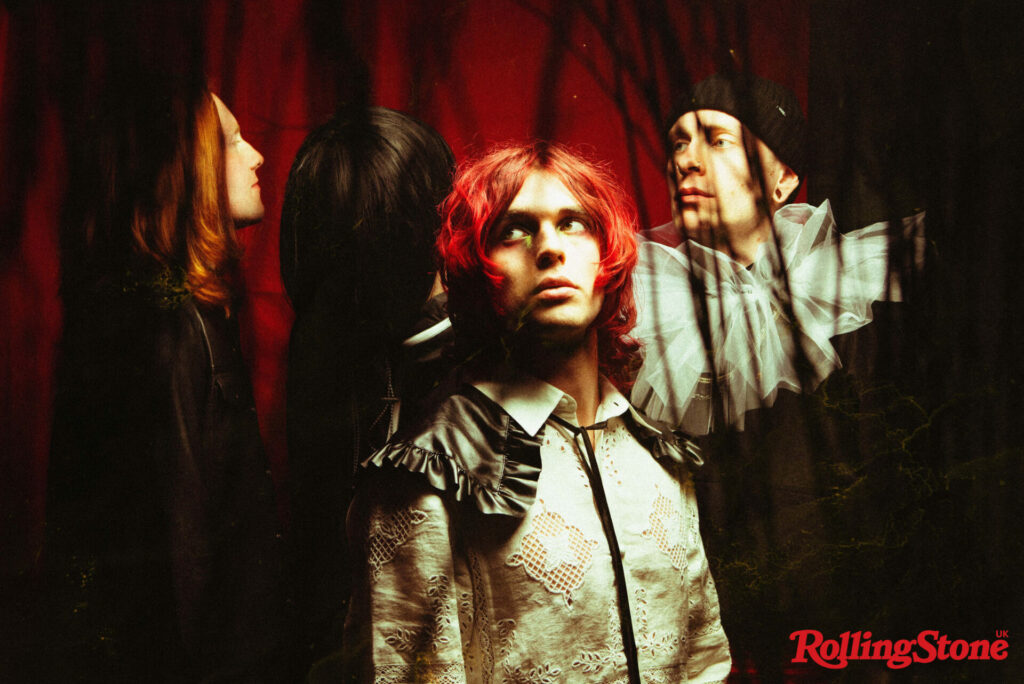
His main driver, he says, is to always maintain a special quality, an antithesis to the fleeting, algorithmic pleasures of our modern age. Static Dress are for the nerds, the fans like Appleyard who “geek out over everything”. At this point, we’re in the Hepworth café, and he holds out his empty cup by way of illustration. “It’s like, if I just came up to you and explained this album that’s coming out, you’d be like, ‘OK, cool.’ But if I just go, ‘There’s that’”— he pushes the cup towards me — “and I won’t tell you what ‘that’ is, you’re going to walk away and get annoyed. You’ll come back to it and obsess over it more. And it’s that obsession that I want to try and create.
“For me” — he pauses dramatically, seemingly pondering whether he really wants to commit to this in print — “I don’t want fans that don’t want to scratch beneath the surface of things. If you’re just gonna be like, swipe, swipe, swipe, I don’t want you listening to my music. All the labels and music executives want you to do is bump up Spotify numbers. I ain’t fucking arsed about that in the slightest.”
For an intentionally alien creature, Appleyard likes to remain informed of what the Earthlings are up to. Our chat ranges from Architects to Charli XCX to Busted to Bad Boy Chiller Crew, a member of whom lived mere streets away from him growing up. His favourite artist is The Weeknd, a person he applauds for always daring to go full concept. If it’s unlike what everyone else is doing, Appleyard is here for it, admiring any artist that is focused on driving their own momentum.
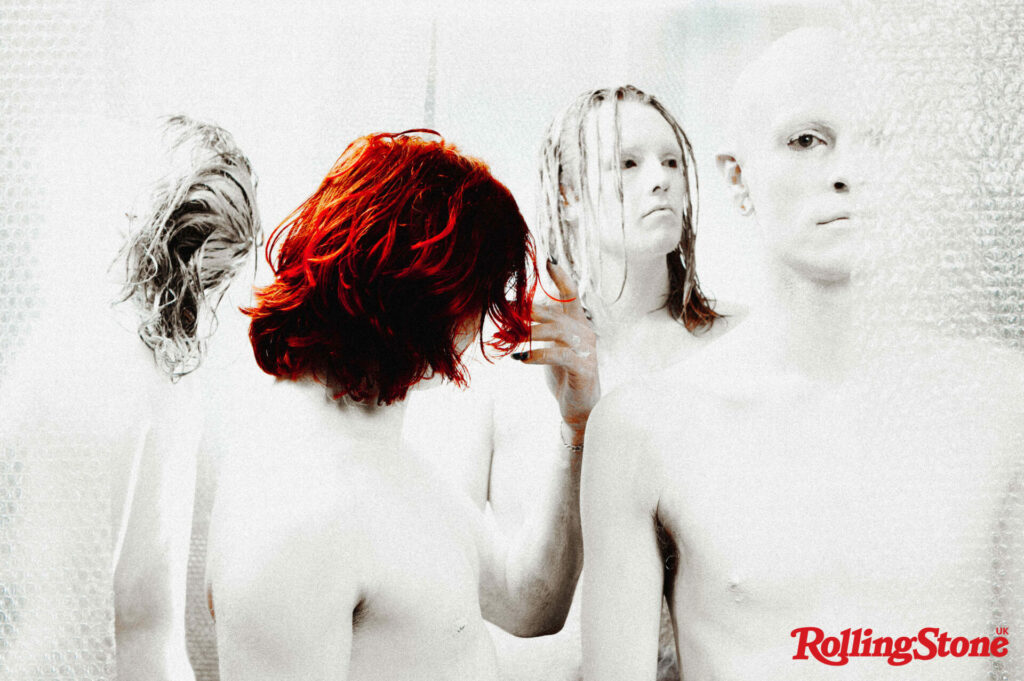
Having envisaged his own album from day dot, he was excited to make good on his own full-length moment, the next stage of his creative blueprint. But when it was time to record it, he found himself faltering, struggling under the weight of bandmates who didn’t seem as sure as he was.
“In hindsight, it was people just not being committed to stuff or not being in the right headspace because of Covid,” he says. “It’s sad because you grew up with these people, you’re best friends, but if you can’t muscle on and get through it…”
Amid difficult personal circumstances that he’d prefer to keep to himself, Appleyard entered what he describes as one of the most traumatic periods of his life. Spiralling into near-hallucinatory breakdown, he began wondering what all his efforts had been for. “I had lost 90 per cent of my friends and couldn’t trust anyone. Within the band, we got [into] this horrible cycle of me always wanting to do more, and them not wanting to do it at all.”

Lost in this sea of “horrible-as-fuck toxicity”, he tried hard to find his way back to shore. A three-week stint in a Welsh cottage with producer Erik Bickerstaffe (of metalcore band Loathe) yielded 10 of the album’s songs, with singles ‘Di-sinTer’ and ‘Such a Shame’ coming in late as an emblem of the album’s intentional sonic versatility. It was a relief, but Appleyard remained a victim of his own exacting standards, agonising over vocal takes.
“There was one day where I was in a cupboard just trying to do all the parts for ‘Welcome In’, rewriting and rewriting it,” he says. “I was in there for nine hours until Erik got me out. I owe a lot to that guy, for real. But because I hate everything I do, it’s kind of helpful in a sense; this album is basically me being like, ‘I can’t do anything more.’ This was all done on a budget, without a label, and it’s a product of the people who have been involved with this band from day one. That for me is a massive, massive thing.”
“There was one day where I was in a cupboard just trying to do all the parts for ‘Welcome In’, rewriting and rewriting it. I was in there for nine hours”
— Olli Appleyard, Static Dress
With Rouge Carpet Disaster diverted from near catastrophe, the group have been able to re-focus on Appleyard’s initial intention of building loyalty through lore, dedication through detail. Nothing was wasted in its process; Prologue, recorded in three months post-album amid tours and festivals, was put out into the world in late November, a comic book/soundtrack project that offered a deep dive into the folklore of the band’s early world, its outro seamlessly transitioning into the new record.
With album-release shows looming, Appleyard is bursting with ideas of how to present things live, excusing him from the awkwardness of mid-set promotion. “You know, all that ‘like and subscribe, hit that notification bell’ stuff — fuck off! I know you’ve got to do it, but the amount of times on that Funeral for a Friend tour that I’d say something and then instantly be like, ‘Shoot me in the fucking head…’”
Somewhat unsurprisingly, he has already begun work on album two. With Rouge Carpet Disaster, he wanted to prove that Static Dress could be “a solid band”, but with the next one, he’ll be digging deeper into new-wave emo, opting for even richer soundscapes.
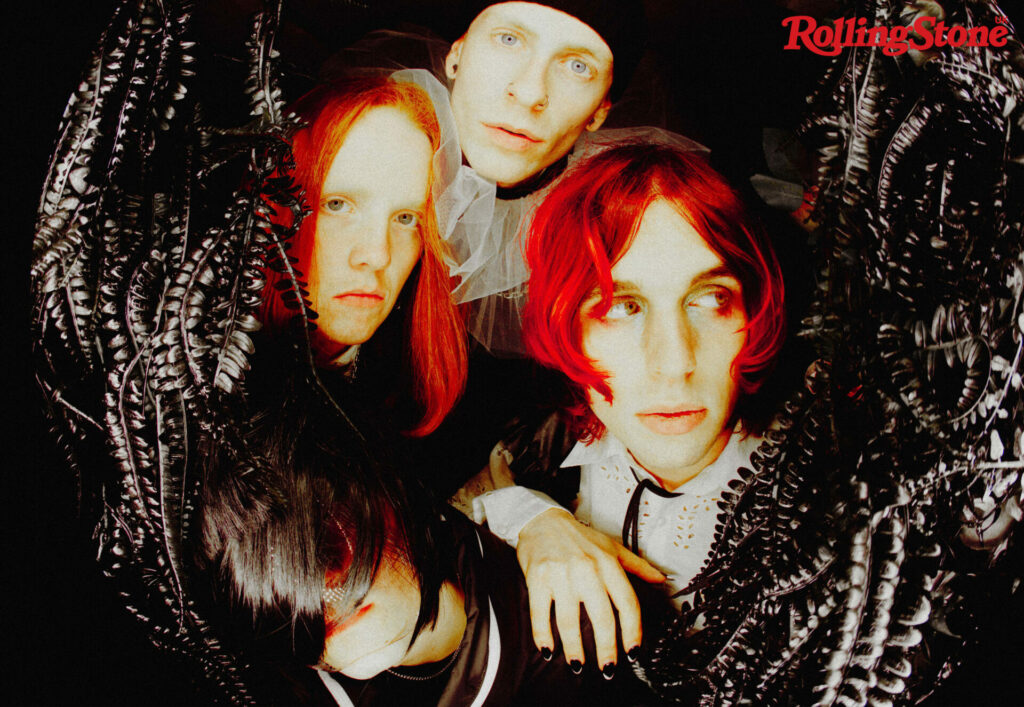
“I’ll have that phase, and then album three will be stupid heavy breakdowns, and album four will be pop as hell, my own Dawn FM,” he laughs. “And then at the same time, it will all look super amazing.” With a new line-up settled in, he feels confident in the band’s future: “Everyone wants the same things now. I might be steering the ship, but now I’ve got other hands on the wheel.”
At this point, we’ve been talking for several hours. The Hepworth is closing, and Appleyard apologises for his lack of brevity, worrying that in previous interviews he’s come across like “a bit of an arrogant dick”. Far from it; what he has is passion, a complex battle of ambition and provocation raging as he tries to match up the proverbial oranges and blues. He’s smart enough to know that people tend to listen on shuffle now, if they listen to a full album at all, and understands that there will come a time where he will have to adapt his creative process to let others in and learn to get more comfortable with the act of self-promotion. Having spent so long establishing Static Dress as an intentionally cult band, Appleyard’s next challenge will be one of scale. When Rouge Carpet Disaster drops, there will be bigger stages, longer Reddit threads, more high-profile interviews. How can one hope to maintain mystery — and sanity — on that ascent?

“I don’t know any other pace,” he says, plainly. “I’m in this to try to help people. And that’s not me being a do-gooder, that absolute fucking white-knight-in-a-plaid-shirt syndrome. There’s already plenty of that. But honestly, the main message that I want to get across is this is an album to make you want to start your own thing, by a band who are trying to be something more than just your run of the mill.
“On paper, it shouldn’t work, but that’s the point of this. It’s artists making music, not musicians making art.” He laughs, pleased with his phrasing. “That’s a good line. You can print that shit!” Knowing him, it won’t be long before he’s thought up something even better.
Taken from the June/July 2022 of Rolling Stone UK. Buy it here.
